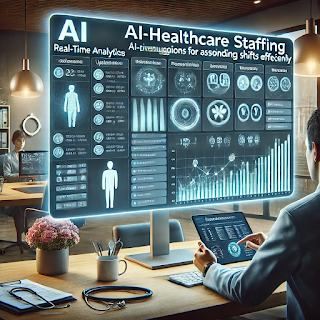Essential Features of Healthcare Staffing Software for 2025
The healthcare industry is evolving rapidly, and staffing challenges are at the forefront of operational concerns. With a growing demand for qualified healthcare professionals, organizations need robust tools to manage staffing efficiently.
Custom healthcare staffing software solutions are no longer a luxury but a necessity in 2025. Let’s explore the essential features of healthcare staffing software that ensure seamless operations and optimized staffing management in this competitive landscape.
1. Advanced Scheduling and Shift Management
Efficient scheduling is the backbone of healthcare staffing management. In 2025, healthcare organizations require staffing software that can automate shift assignments based on availability, qualifications, and compliance requirements. Features like:
Dynamic Schedule Building: Adjust schedules in real-time to address last-minute changes or emergencies.
Shift Swapping: Enable staff to swap shifts with approval workflows.
Forecasting Tools: Use AI-driven predictions to anticipate staffing needs during peak periods.
These capabilities ensure that healthcare facilities maintain adequate coverage without overburdening staff, improving operational efficiency and job satisfaction.
2. Integrated Credential and Compliance Tracking
Keeping track of staff credentials and ensuring compliance is crucial in healthcare. A modern healthcare staffing software should:
Monitor Certifications: Track license expirations, certifications, and training completions.
Automate Alerts: Send notifications for expiring credentials or required renewals.
Ensure Regulatory Compliance: Stay aligned with industry regulations like HIPAA and OSHA to avoid penalties.
With these features, healthcare organizations can focus on delivering quality care without worrying about compliance gaps.
3. Customizable Dashboards and Reporting
In 2025, decision-making relies heavily on data. Customizable dashboards are essential for healthcare staffing software, offering insights into staffing trends, overtime costs, and workforce utilization. Key features include:
Real-Time Analytics: Monitor staff performance, availability, and coverage in real-time.
Detailed Reports: Generate reports on staffing efficiency, attendance, and turnover rates.
Custom KPIs: Tailor key performance indicators to align with organizational goals.
These tools empower management to make informed decisions quickly and effectively.
4. Mobile Access and Employee Self-Service
A mobile-friendly platform is non-negotiable for healthcare staffing management in 2025. Healthcare professionals need on-the-go access to schedules and other essential features. Modern solutions should offer:
Mobile App Integration: Allow staff to view schedules, accept shifts, and update availability from their smartphones.
Self-Service Portals: Enable employees to request time off, update preferences, and manage their profiles.
Push Notifications: Send instant alerts for schedule changes, open shifts, or important updates.
This level of accessibility improves engagement and streamlines communication between staff and management.
5. AI-Powered Recruitment and Talent Matching
The healthcare staffing industry faces persistent recruitment challenges. Custom healthcare staffing software solutions can leverage AI to streamline hiring processes. Features to look for include:
Candidate Matching: Use AI algorithms to match candidates with open positions based on skills, location, and experience.
Automated Interviews: Pre-screen candidates through AI-driven video interviews or questionnaires.
Talent Pools: Build and maintain a database of qualified candidates for future staffing needs.
By automating recruitment, organizations can reduce time-to-hire and ensure that they’re bringing the best talent on board.
6. Real-Time Communication Tools
Effective communication is vital in healthcare staffing management. The software should include integrated communication tools such as:
Instant Messaging: Facilitate real-time collaboration between staff and management.
Broadcast Announcements: Share critical updates with the entire workforce or specific teams.
Shift Alerts: Notify staff immediately about open shifts or schedule changes.
These tools eliminate communication barriers and foster better coordination within healthcare teams.
7. Payroll and Billing Integration
Managing payroll and billing is a complex task in healthcare. Modern healthcare staffing software should simplify this process with features such as:
Payroll Automation: Calculate wages based on hours worked, overtime, and compliance factors.
Billing Management: Streamline invoicing for temporary staff or outsourced services.
Expense Tracking: Record expenses related to staffing, such as travel or training.
Integrated payroll and billing systems save time and reduce errors, ensuring financial accuracy and transparency.
8. Cloud-Based and Secure
Security and accessibility are paramount in 2025. Cloud-based solutions ensure that healthcare staffing software is scalable, reliable, and secure. Essential features include:
Data Encryption: Protect sensitive information with robust encryption protocols.
Role-Based Access: Control who can access specific data or functionalities.
Automatic Backups: Ensure data is regularly backed up to prevent loss.
A cloud-based system also allows healthcare organizations to access their data anytime, anywhere.
9. Scalability and Customization
No two healthcare organizations are the same. Custom healthcare staffing software solutions should be adaptable to varying needs. Look for features that offer:
Modular Design: Add or remove functionalities as needed.
Custom Workflows: Tailor workflows to align with unique staffing processes.
Scalability: Support organizational growth without disruptions.
This flexibility ensures that the software remains relevant as the organization evolves.
10. Integration with Existing Systems
Seamless integration with existing systems like electronic health records (EHR), HR software, and time-tracking tools is essential. Key integrations include:
EHR Compatibility: Sync staff schedules with patient care needs.
HR Systems: Streamline hiring, onboarding, and performance management.
Time-Tracking Tools: Ensure accurate attendance and payroll processing.
These integrations reduce redundancy and improve overall efficiency.
Final Thoughts
In 2025, healthcare staffing management will demand innovative and flexible solutions to address the unique challenges of the industry. Investing in custom healthcare staffing software solutions equipped with these essential features can streamline operations, improve staff satisfaction, and enhance patient care.
By prioritizing advanced scheduling, AI-driven recruitment, real-time communication, and compliance tracking, healthcare organizations can stay ahead in an ever-competitive field.
Is your organization ready for the future of healthcare staffing? Reach out to explore how custom solutions can meet your unique needs!




Comments
Post a Comment